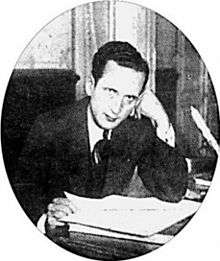Boris Skossyreff
| Borís I d'Andorra | |
|---|---|
 King Boris I of Andorra 1934 | |
| Born |
Borís Mikhàilovitx Skóssirev-Mavrusov January 12, 1896 Vilnius, Lithuania-Vilnius Governorate, Russian Empire |
| Died |
February 27, 1989 Boppard, West Germany |
| Spouse(s) | Maria Lluïsa Parat (1931-?) |
| Parent(s) | Micheal Skossyreff and Elisabeth Mawrusow |
Boris Mikhailovich Skossyreff (Russian: Бори́с Миха́йлович Ско́сырев, Boris Mikhailovich Skosyrev; Catalan: Borís Mikhàilovitx Skóssirev; born January 12, 1896) was a White Russian adventurer who attempted to seize power in the European state of Andorra during the early 1930s.
Biography
Skossyreff was born on June 12, 1896, in Vilnius, then part of the Russian Empire, died 1989.[1]
In January 1919, described as a former translator for the Japanese Military Mission, Skossyreff appeared in the Westminster Police Court in London, charged and fined for passing fraudulent checks.
Skossyreff moved to Andorra and received Andorran citizenship in December 1933. After some time, he presented an administrative reform plan that included the creation of several offices, to which he asked to be appointed. However, he soon ran afoul of local authorities and was expelled around May 1934.
On July 6, 1934, he issued a proclamation in Urgell, Spain, declaring himself Boris I, King of Andorra and "Regent for His Majesty the King of France." Despite his claim that he was acting on behalf of the French Crown, France had not been a Kingdom since 1848, and he was disavowed by the formerly-ruling House of Bourbon. Skossyreff declared war on Justí Guitart i Vilardebó, Bishop of Urgell and the Co-Prince of Andorra. Two days later, the General Council of Andorra voted unanimously for the monarchy, and a provisional government was formed the next day. The General Council became the Parliament, a new flag adorned with a crown was adopted, and a new constitution was drafted.
On July 20, Skossyreff was arrested by the Spanish Guardia Civil and deported from Andorra.[2] He was first taken to Barcelona and was to be transferred to Madrid on July 22. However, his transfer was delayed when he refused to travel via train in third-class. When his appeal to a friend to pay his first-class fare did not receive a response, two Catalan detectives accompanied him to Madrid on July 23.[3] Skossyreff was imprisoned there until he was deported from Spain to Portugal in November.
Spanish authorities noted that Skossyreff carried a Dutch passport, but declared himself to be a Russian White émigré. However, this background is somewhat contradicted by a report in the publication Spain Week by Week, which claimed on July 25, 1934, that Skossyreff was a Jew who resided for some years in Catalonia and Majorca.[4] That account also contended that Skossyreff had made his proclamation on July 11 and that he had declared himself "Boris I, Prince of the Valleys of Andorra, Count of Orange and Baron of Skossyreff… Sovereign of Andorra and Defender of the Faith."
Some sources claim that Skossyreff died in a Vichy French prison camp near Perpignan in 1944. However, others argue he survived and became a civilian technician for the Wehrmacht on the Eastern Front in World War II.
Legacy
Some Russian-language publications and websites erroneously claim that Skossyreff ruled Andorra for a number of years until he was overthrown by Vichy France in 1941.[5] However, other Russian sources refute this claim,[6] and it is not supported by accounts in other languages.
A novel, titled Boris I, Rei d'Andorra (Boris I, King of Andorra) was written in 1984 by Catalan author Antoni Morell i Mora.[7] The author dedicated the book to his grandmother, who he claimed had personally met Boris. It was later adapted for the stage by Beth Escuda.[8]
References
- ↑ http://www.historyfiles.co.uk/FeaturesEurope/EasternRussia_Skossyreff01.htm
- ↑ Times, Wireless To The New York (1934-07-21). "' PRINCE' OF ANDORRA IS ARRESTED IN SPAIN; ' Boris I' Is Taken to Barcelona When Madrid Decides 'Antics' Had Gone Far Enough". The New York Times. ISSN 0362-4331. Retrieved 2017-02-03.
- ↑ Times, Wireless To The New York (1934-07-24). "' KING BORIS' IS TAKEN TO PRISON IN MADRID; Self-Styled Ruler of Andorra Is Forced to Travel From Barcelona Third-Class". The New York Times. ISSN 0362-4331. Retrieved 2017-02-03.
- ↑ "'Spain week by week". Bulletin of Spanish Studies. 11 (44): 209–216. 1934. doi:10.1080/14753825012331364384.
- ↑ . Rossiyskaya Gazeta http://www.rg.ru/prilog/ES/0710/4.htm>. Missing or empty
|title=(help) - ↑ "New Mythology - Boris the First, King of Andorra" (in Russian). Conservator.ru.
- ↑ Morell, Antoni (1984). Borís I, Rei D'andorra. La Magrana. ISBN 84-7410-157-3.
- ↑ Official website of the play
External links
- (in Spanish) Borís Skossyreff: el aventurero ruso que se proclamó Rey de Andorra
- (in Russian) rg.ru
- (in German) Boris I. King of Andorra
- (in Portuguese) olhao.web.pt, with a photograph of his tombstone.
- information on former files at The National Archives and other sources.
- Collection of articles in Catalan, Spanish, and English
- An article on The History Files, with a list of references
Bibliography
- The Times has a number of articles about Boris Skossyreff - both the takeover and the 1919 incident mentioned above (6 January 1919 p 4, 13 January p 2, 18 January p 5, and 20 January p 5).
- Regional Surveys of the World, Western Europe 2003, Fifth Edition 2003, Editors Juliet Love i Jilian O'Brien (in English)
- Andorra Business Law Handbook. International Business Publications, USA. Washington, DC 20003. 6th Edition Updated. ISBN 1-4330-0104-7 (in English)
- Thomas Eccardt. Secrets of the Seven Smallest States of Europe. Hippocrene Books, Inc. 171 Madison Avenue, New York, NY 10016. ISBN 0-7818-1032-9. (in English)
- Luis Capdevila. Nouvelle Découverte de l'Andorre. Nouvelles Editions Latines. Paris 1959, p. 180 i següents (in French)
- Gerhard Lang-Valchs, Boris von Skossyreff: rey de los andorranos, agente de los alemanes, Círculo Rojo, Almería, 2018 ISBN 9788491947097 (in Spanish)
- Miguel Izu, El rey de Andorra, Editorial Berenice, Córdobam 2018, ISBN 9788417418625 (in Spanish)